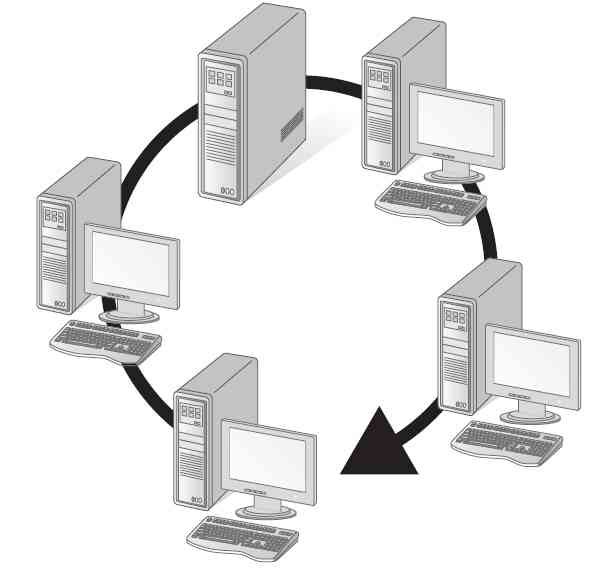RING TOPOLOGIES AND THEIR ADVANTAGES AND DISADVANTAGES
In a ring topology, all computers are connected via a cable that loops in a ring or circle. As shown in Figure 1, a ring topology is a circle that has no start and no end. Because there are no ends, terminators are not necessary in a ring topology. Signals travel in one direction on a ring while they are passed from one computer to the next, with each computer regenerating the signal so that it may travel the distance required.
 |
| Figure 1: Ring Topology |
ADVANTAGES OF RING TOPOLOGY:
A major advantage of a ring topology is that signal degeneration is low because each workstation is responsible for regenerating or boosting the signal. With the other topologies, as the signal travels the wire, it gets weaker and weaker as a result of outside interference: eventually, it becomes unreadable if the destination system is too far away. Because each workstation in a ring topology regenerates the signal, the signal is stronger when it reaches its destination and seldom needs to be retransmitted.
DISADVANTAGES OF RING TOPOLOGY:
The biggest problem with ring topologies is that if one computer fails or the cable link is broken, the entire network could go down. With newer technology, however, this isn’t always the case. The concept of a ring topology today is that the ring will not be broken when a system is disconnected; only that system is dropped from the ring. Isolating a problem can be difficult in some ring configurations. (With newer technologies, a workstation or server will put out a beacon if it notices a break in the ring.) Another disadvantage is that if you make a cabling change to the network or move a workstation, the brief disconnection can interrupt or bring down the entire network.
Related topic – click here
- Types Of Losses In Transformer Explained
- Differences Between 8085 And 8086 Microprocessor
- 8085 Microprocessor Architecture | Working On 8085 Microprocessor
- Difference Between Single-Phase And Three-Phase Transformer
- Water Filter Essential For Purification Of Drinking Water
- Thermocouple Types And Comparison | Thermocouple Of 8000-Liter Storage Tank




